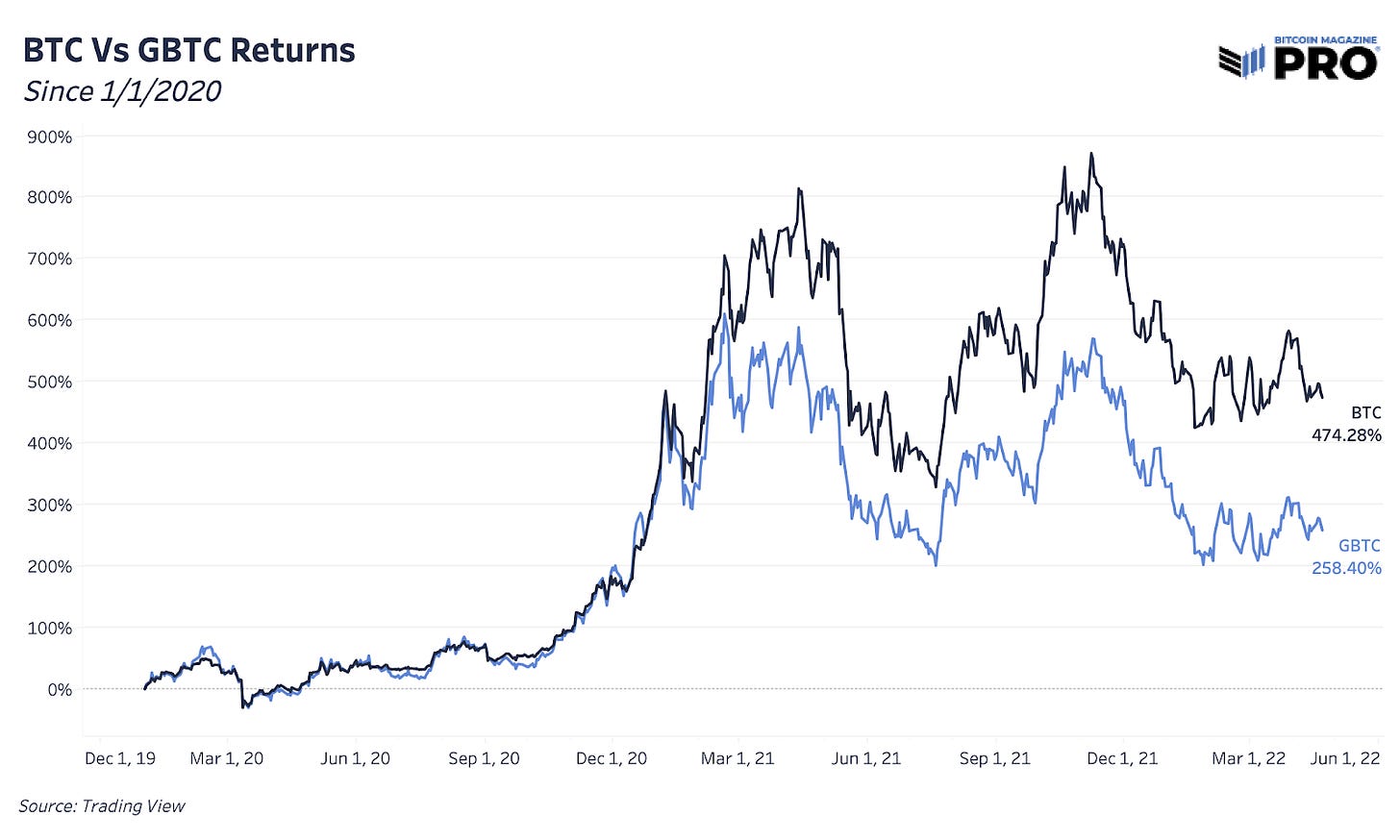When U.S. Bitcoin Spot ETF?
One of the more interesting long-term bitcoin opportunities for investors since January of this year is the Grayscale Bitcoin Trust, which trades at a 23.15% discount to net asset value (NAV) — up from its near 30% discount low. As this discount closes, this can show signs of general institutional demand coming back into the market and/or that the market is pricing in a higher probability of a Grayscale U.S. spot ETF approval.
In our January Monthly Report, there’s an extensive section on the GBTC impact on the overall market, highlighting that
“For the time being, shares of GBTC look to present an attractive opportunity to buy bitcoin at a large discount for institutional investors or for exposure in traditional retirement accounts. It should be noted that shares of GBTC do not have the native properties that bitcoin itself carries (i.e., sovereign ownership, censorship resistance, global liquidity).
One should expect the GBTC discount to approach closer to NAV before significant price appreciation in bitcoin (the asset itself), due to the incentive the discount places to allocate to GBTC.”
ETF experts expect that the timeline for a bitcoin spot ETF approval is early summer 2023. Although Gary Gensler has publicly expressed his opinion that the Bitcoin innovation and whitepaper is a significant achievement and has distinguished it as a commodity from other cryptocurrencies (potential securities), the Securities Exchange Commission has been clear in its rejection of spot ETFs that they are not planning to approve applications any time soon.
Just like the bitcoin futures ETF has the Chicago Mercantile Exchange, the SEC written denials outline an applicant to identify an “exchange [that] has a comprehensive surveillance-sharing agreement with a regulated market of significant size related to the underlying or reference bitcoin assets.”
Unless that requirement is satisfied or potential litigation from Grayscale forces a change in precedent, a spot ETF approval is highly unlikely. The most likely change is highlighted in the ETF experts link above where the SEC would expand the definition of “exchange,” which would help clear the way for approval.
Ideally, the way to truly own bitcoin is to buy the asset outright and self-custody it. Yet, institutions and investors will demand a range of ownership options. Investors holding GBTC over the last two years versus those owning bitcoin outright have vastly underperformed bitcoin’s returns because of Grayscale’s management fees and the heavy NAV discount regime.
Since 2020, bitcoin has returned 474% while GBTC returned 258%. Since 2021, bitcoin returned 25% while GBTC returned -18%.
Yet, the case for GBTC now is that it will outperform bitcoin if the NAV discount continues to close. Since the discount low in January, GBTC has outperformed bitcoin so far this year.
Final Note
As more bitcoin spot ETFs roll out globally (with the latest being Australia to roll out next week), pressure rises for the United States to follow suit. The market will demand more than bitcoin-trust vehicles and futures ETFs that significantly underperform bitcoin itself. The GBTC discount and premium is one of the best market indicators available to track the progress in the United States.
In Bitwise’s latest 2022 Benchmark Survey, 82% of advisor respondents prefer to own a spot bitcoin ETF versus a futures ETF. There’s clear market demand for bitcoin spot ETF vehicles: we can expect more waves of capital to flow into the market as spot ETFs become more accessible, Bitcoin education across financial advisors continues to grow and regulation concerns are eased bringing more clarity.










This is a great coverage of a difficult subject. Especially liked the SEC clarification with an exchange. Thanks, Sam.
Great read, Sam.